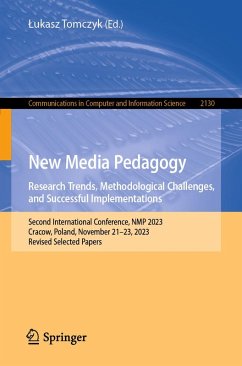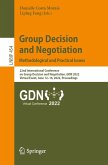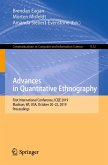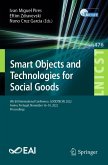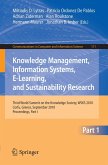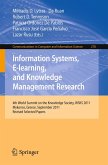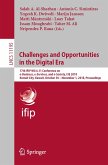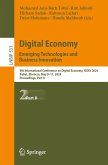New Media Pedagogy: Research Trends, Methodological Challenges, and Successful Implementations (eBook, PDF)
Second International Conference, NMP 2023, Cracow, Poland, November 21-23, 2023, Revised Selected Papers
Redaktion: Tomczyk, Lukasz
105,95 €
105,95 €
inkl. MwSt.
Sofort per Download lieferbar

53 °P sammeln
105,95 €
Als Download kaufen

105,95 €
inkl. MwSt.
Sofort per Download lieferbar

53 °P sammeln
Jetzt verschenken
Alle Infos zum eBook verschenken
105,95 €
inkl. MwSt.
Sofort per Download lieferbar
Alle Infos zum eBook verschenken

53 °P sammeln
New Media Pedagogy: Research Trends, Methodological Challenges, and Successful Implementations (eBook, PDF)
Second International Conference, NMP 2023, Cracow, Poland, November 21-23, 2023, Revised Selected Papers
Redaktion: Tomczyk, Lukasz
- Format: PDF
- Merkliste
- Auf die Merkliste
- Bewerten Bewerten
- Teilen
- Produkt teilen
- Produkterinnerung
- Produkterinnerung

Bitte loggen Sie sich zunächst in Ihr Kundenkonto ein oder registrieren Sie sich bei
bücher.de, um das eBook-Abo tolino select nutzen zu können.
Hier können Sie sich einloggen
Hier können Sie sich einloggen
Sie sind bereits eingeloggt. Klicken Sie auf 2. tolino select Abo, um fortzufahren.

Bitte loggen Sie sich zunächst in Ihr Kundenkonto ein oder registrieren Sie sich bei bücher.de, um das eBook-Abo tolino select nutzen zu können.
Chapters "4" is available open access under a Creative Commons Attribution 4.0 International License via link.springer.com.
- Geräte: PC
- ohne Kopierschutz
- eBook Hilfe
- Größe: 19.86MB
Andere Kunden interessierten sich auch für
![Group Decision and Negotiation: Methodological and Practical Issues (eBook, PDF) Group Decision and Negotiation: Methodological and Practical Issues (eBook, PDF)]() Group Decision and Negotiation: Methodological and Practical Issues (eBook, PDF)44,95 €
Group Decision and Negotiation: Methodological and Practical Issues (eBook, PDF)44,95 €![Advances in Quantitative Ethnography (eBook, PDF) Advances in Quantitative Ethnography (eBook, PDF)]() Advances in Quantitative Ethnography (eBook, PDF)40,95 €
Advances in Quantitative Ethnography (eBook, PDF)40,95 €![Smart Objects and Technologies for Social Goods (eBook, PDF) Smart Objects and Technologies for Social Goods (eBook, PDF)]() Smart Objects and Technologies for Social Goods (eBook, PDF)53,95 €
Smart Objects and Technologies for Social Goods (eBook, PDF)53,95 €![Knowledge Management, Information Systems, E-Learning, and Sustainability Research (eBook, PDF) Knowledge Management, Information Systems, E-Learning, and Sustainability Research (eBook, PDF)]() Knowledge Management, Information Systems, E-Learning, and Sustainability Research (eBook, PDF)73,95 €
Knowledge Management, Information Systems, E-Learning, and Sustainability Research (eBook, PDF)73,95 €![Information Systems, E-learning, and Knowledge Management Research (eBook, PDF) Information Systems, E-learning, and Knowledge Management Research (eBook, PDF)]() Information Systems, E-learning, and Knowledge Management Research (eBook, PDF)73,95 €
Information Systems, E-learning, and Knowledge Management Research (eBook, PDF)73,95 €![Challenges and Opportunities in the Digital Era (eBook, PDF) Challenges and Opportunities in the Digital Era (eBook, PDF)]() Challenges and Opportunities in the Digital Era (eBook, PDF)40,95 €
Challenges and Opportunities in the Digital Era (eBook, PDF)40,95 €![Digital Economy. Emerging Technologies and Business Innovation (eBook, PDF) Digital Economy. Emerging Technologies and Business Innovation (eBook, PDF)]() Digital Economy. Emerging Technologies and Business Innovation (eBook, PDF)105,95 €
Digital Economy. Emerging Technologies and Business Innovation (eBook, PDF)105,95 €-
-
-
Chapters "4" is available open access under a Creative Commons Attribution 4.0 International License via link.springer.com.
Dieser Download kann aus rechtlichen Gründen nur mit Rechnungsadresse in A, B, BG, CY, CZ, D, DK, EW, E, FIN, F, GR, HR, H, IRL, I, LT, L, LR, M, NL, PL, P, R, S, SLO, SK ausgeliefert werden.
Produktdetails
- Produktdetails
- Verlag: Springer International Publishing
- Seitenzahl: 456
- Erscheinungstermin: 30. Juni 2024
- Englisch
- ISBN-13: 9783031632358
- Artikelnr.: 72240799
- Verlag: Springer International Publishing
- Seitenzahl: 456
- Erscheinungstermin: 30. Juni 2024
- Englisch
- ISBN-13: 9783031632358
- Artikelnr.: 72240799
- Herstellerkennzeichnung Die Herstellerinformationen sind derzeit nicht verfügbar.
.- Teacher digital and media competence in cyber security a perspective on individual resilience to online attacks.
.- Digital Literacy and Perception of Inclusive Education of Preservice Teachers at Indonesian Universities.
.- Digital Education in German Primary Schools A Challenge for School Leadership.
.- Pathway analysis of the dynamics of teacher educators' professional digital competence.
.- Digital skills in contemporary schools where we are and where we should go.
.- Comparing Pre Service Preschool and Primary School Teachers' Views on Their Pedagogical Digital Competencies, Attitudes, and Future Use of Digital Technologies in Teaching.
.- The Dilemma of Teacher Training for the Use of the Metaverse and Other Immersive Technologies in Teaching and Learning Processes: An Integrative Review.
.- Information and communications technology used by Polish speech-language therapists: research project report.
.- Designing and Developing Educational Mobile Application Training for Teacher Candidates for Innovative Pathways.
.- NICT Acceptance Among Teachers and Students in the Context of Higher Education Reform in Morocco.
.- Current situation due to the persistent impact of COVID19.
.- Learning in a high speed society: inquiring deceleration by digital means.
.- Digital competence as outlined in online prospectuses for taught postgraduate TESOL degrees in Scotland: A preliminary study.
.- NDBI practices for autistic students: teachers' reflections from a qualitative perspective about an online program.
.- Digital Inclusion and Exclusion and Development of Human Resources in European Countries.
.- Emergency remote teaching during the crisis situations.
.- Comparative perspective of Ukraine and Poland.
.- Developing digital competency in health and physical education: when digital literacy meets physical literacy.
.- Exploring the potential of audiovisual social platforms in Higher Education.
.- Developing digital competency in health and physical education: when digital literacy meets physical literacy.
.- Parental Control and Internet Use among Italian Adolescents.
.- From STEAM to STREAM integrating research.
.- STEM Education Using Digital Tools in Undergraduate Teacher Education.
.- IoT in Education using open data.
.- AI literacy in higher education theory and design.
.- Unpacking Experts' Opinions on ChatGPT Potential Assistive Roles and Risks in Early Childhood Special Education.
.- Artificial Intelligence in Secondary Education an Innovative Teacher's Tool to Ensure Individualised Learning for Students.
.- Artificial Intelligence A review of educational literature in Spain.
.- Equity Issues derived from Use of Large Language Models in Education.
.- Digital Trends of the Scientific and Technological Revolution Institutional Transformations of Science and Education Systems in the Paradigm of Sustainable Social Development.
.- Digital Literacy and Perception of Inclusive Education of Preservice Teachers at Indonesian Universities.
.- Digital Education in German Primary Schools A Challenge for School Leadership.
.- Pathway analysis of the dynamics of teacher educators' professional digital competence.
.- Digital skills in contemporary schools where we are and where we should go.
.- Comparing Pre Service Preschool and Primary School Teachers' Views on Their Pedagogical Digital Competencies, Attitudes, and Future Use of Digital Technologies in Teaching.
.- The Dilemma of Teacher Training for the Use of the Metaverse and Other Immersive Technologies in Teaching and Learning Processes: An Integrative Review.
.- Information and communications technology used by Polish speech-language therapists: research project report.
.- Designing and Developing Educational Mobile Application Training for Teacher Candidates for Innovative Pathways.
.- NICT Acceptance Among Teachers and Students in the Context of Higher Education Reform in Morocco.
.- Current situation due to the persistent impact of COVID19.
.- Learning in a high speed society: inquiring deceleration by digital means.
.- Digital competence as outlined in online prospectuses for taught postgraduate TESOL degrees in Scotland: A preliminary study.
.- NDBI practices for autistic students: teachers' reflections from a qualitative perspective about an online program.
.- Digital Inclusion and Exclusion and Development of Human Resources in European Countries.
.- Emergency remote teaching during the crisis situations.
.- Comparative perspective of Ukraine and Poland.
.- Developing digital competency in health and physical education: when digital literacy meets physical literacy.
.- Exploring the potential of audiovisual social platforms in Higher Education.
.- Developing digital competency in health and physical education: when digital literacy meets physical literacy.
.- Parental Control and Internet Use among Italian Adolescents.
.- From STEAM to STREAM integrating research.
.- STEM Education Using Digital Tools in Undergraduate Teacher Education.
.- IoT in Education using open data.
.- AI literacy in higher education theory and design.
.- Unpacking Experts' Opinions on ChatGPT Potential Assistive Roles and Risks in Early Childhood Special Education.
.- Artificial Intelligence in Secondary Education an Innovative Teacher's Tool to Ensure Individualised Learning for Students.
.- Artificial Intelligence A review of educational literature in Spain.
.- Equity Issues derived from Use of Large Language Models in Education.
.- Digital Trends of the Scientific and Technological Revolution Institutional Transformations of Science and Education Systems in the Paradigm of Sustainable Social Development.
.- Teacher digital and media competence in cyber security a perspective on individual resilience to online attacks.
.- Digital Literacy and Perception of Inclusive Education of Preservice Teachers at Indonesian Universities.
.- Digital Education in German Primary Schools A Challenge for School Leadership.
.- Pathway analysis of the dynamics of teacher educators' professional digital competence.
.- Digital skills in contemporary schools where we are and where we should go.
.- Comparing Pre Service Preschool and Primary School Teachers' Views on Their Pedagogical Digital Competencies, Attitudes, and Future Use of Digital Technologies in Teaching.
.- The Dilemma of Teacher Training for the Use of the Metaverse and Other Immersive Technologies in Teaching and Learning Processes: An Integrative Review.
.- Information and communications technology used by Polish speech-language therapists: research project report.
.- Designing and Developing Educational Mobile Application Training for Teacher Candidates for Innovative Pathways.
.- NICT Acceptance Among Teachers and Students in the Context of Higher Education Reform in Morocco.
.- Current situation due to the persistent impact of COVID19.
.- Learning in a high speed society: inquiring deceleration by digital means.
.- Digital competence as outlined in online prospectuses for taught postgraduate TESOL degrees in Scotland: A preliminary study.
.- NDBI practices for autistic students: teachers' reflections from a qualitative perspective about an online program.
.- Digital Inclusion and Exclusion and Development of Human Resources in European Countries.
.- Emergency remote teaching during the crisis situations.
.- Comparative perspective of Ukraine and Poland.
.- Developing digital competency in health and physical education: when digital literacy meets physical literacy.
.- Exploring the potential of audiovisual social platforms in Higher Education.
.- Developing digital competency in health and physical education: when digital literacy meets physical literacy.
.- Parental Control and Internet Use among Italian Adolescents.
.- From STEAM to STREAM integrating research.
.- STEM Education Using Digital Tools in Undergraduate Teacher Education.
.- IoT in Education using open data.
.- AI literacy in higher education theory and design.
.- Unpacking Experts' Opinions on ChatGPT Potential Assistive Roles and Risks in Early Childhood Special Education.
.- Artificial Intelligence in Secondary Education an Innovative Teacher's Tool to Ensure Individualised Learning for Students.
.- Artificial Intelligence A review of educational literature in Spain.
.- Equity Issues derived from Use of Large Language Models in Education.
.- Digital Trends of the Scientific and Technological Revolution Institutional Transformations of Science and Education Systems in the Paradigm of Sustainable Social Development.
.- Digital Literacy and Perception of Inclusive Education of Preservice Teachers at Indonesian Universities.
.- Digital Education in German Primary Schools A Challenge for School Leadership.
.- Pathway analysis of the dynamics of teacher educators' professional digital competence.
.- Digital skills in contemporary schools where we are and where we should go.
.- Comparing Pre Service Preschool and Primary School Teachers' Views on Their Pedagogical Digital Competencies, Attitudes, and Future Use of Digital Technologies in Teaching.
.- The Dilemma of Teacher Training for the Use of the Metaverse and Other Immersive Technologies in Teaching and Learning Processes: An Integrative Review.
.- Information and communications technology used by Polish speech-language therapists: research project report.
.- Designing and Developing Educational Mobile Application Training for Teacher Candidates for Innovative Pathways.
.- NICT Acceptance Among Teachers and Students in the Context of Higher Education Reform in Morocco.
.- Current situation due to the persistent impact of COVID19.
.- Learning in a high speed society: inquiring deceleration by digital means.
.- Digital competence as outlined in online prospectuses for taught postgraduate TESOL degrees in Scotland: A preliminary study.
.- NDBI practices for autistic students: teachers' reflections from a qualitative perspective about an online program.
.- Digital Inclusion and Exclusion and Development of Human Resources in European Countries.
.- Emergency remote teaching during the crisis situations.
.- Comparative perspective of Ukraine and Poland.
.- Developing digital competency in health and physical education: when digital literacy meets physical literacy.
.- Exploring the potential of audiovisual social platforms in Higher Education.
.- Developing digital competency in health and physical education: when digital literacy meets physical literacy.
.- Parental Control and Internet Use among Italian Adolescents.
.- From STEAM to STREAM integrating research.
.- STEM Education Using Digital Tools in Undergraduate Teacher Education.
.- IoT in Education using open data.
.- AI literacy in higher education theory and design.
.- Unpacking Experts' Opinions on ChatGPT Potential Assistive Roles and Risks in Early Childhood Special Education.
.- Artificial Intelligence in Secondary Education an Innovative Teacher's Tool to Ensure Individualised Learning for Students.
.- Artificial Intelligence A review of educational literature in Spain.
.- Equity Issues derived from Use of Large Language Models in Education.
.- Digital Trends of the Scientific and Technological Revolution Institutional Transformations of Science and Education Systems in the Paradigm of Sustainable Social Development.
